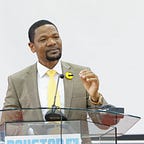An insightful African proverb reminds us that “a youth that does not cultivate friendship with the elderly is like a tree without roots”. This proverb reminds youth and the young at heart are complementary. It fits spot-on with the reality encapsulated in this year’s International Youth Day with the theme “Intergenerational Solidarity: Creating a World for all Ages.”
Today, across Africa and the globe, humanity and our shared environment face three of the most existential threats to their well-being caused by unsustainable production and consumption patterns. Nature & biodiversity loss, climate change, and pollution & waste are urgent threats that need to be urgently addressed. These challenges have significantly impacted African economic progress, and these impacts have swept through all regardless of age. For example, in terms of nature and biodiversity loss, Africa loses over $120 billion yearly — $65billion from invasive alien species and up to $65billion from land degradation, among others. These losses mean farmers producing food across Africa, with an average age of 32–39 years, and 38–45years, which encompasses both young and older actors, have to do with less every season. It means tourism & wildlife jobs estimated at 23million across Africa, of both youth and older people, are at risk of decline. On pollution & waste, Africa faces over $400 billion in losses yearly –to chemical pollution through pesticides, costing Africa over $90 billion in illnesses that affect all ages. Compounding all these challenges is climate change, where African economies already lose over $20 billion annually on the lower side.
What we see here is clear. While these challenges know no age, reversing them portends recouping billions of opportunities that can likewise accrue to all regardless of age. Solving them will therefore require joint efforts that are age-neutral. It behoves us to join forces, regardless of age, and address these challenges.
Already, some examples show how effective this symbiosis can be. In Cameroon, for example, young people with technical skills in developing biodigester solutions have joined forces with older people in local cooperatives to make waste-recovery to clean cooking biogas a reality for thousands of families. Between 7000 -11,400 Cameroonians die every year from indoor pollution driven by unclean cooking. A village in the central region has said enough is enough. Youth have collaborated symbiotically with older people to set up a biodigester that recovers agro waste to clean cooking gas. Through this symbiosis, families and enterprises running eateries have contributed unskilled labour and material. At the same time, the youth used their skills to put up a biodigester that is now providing clean cooking gas for the village. This solution has also aligned with Cameroon’s NDCs that call for an up to 10% increase in biodigester solutions.
This is a spectacular example of inter-generational collaboration that must now become the norm in combating the triple-planetary crises. To make this happen, the following needs to be prioritised,
First, skills retooling of young people, to equip them with abilities for solutions in addressing on-demand challenges in our communities, must become the norm. Youth need to tap opportunities for self-training to gain skills in addressing the triple planetary crises and to address leading issues felt in communities.
Second, communities need to leverage cooperatives as structures for savings and invest in addressing the triple planetary crises in a manner that unlocks opportunities for themselves.
Third, we need empirical data from work done by symbiotic actions that deliver solutions to the triple crises in communities, being leveraged to inform targeted policy incentives that can expand such symbiotic efforts. For example, we can have training scholarships given to such young people to expand and refine their skills. We can give fiscal incentives to cooperatives to enable them to lend at cheaper interest rates to members working symbiotically with youth to deliver solutions to the triple crises.
The truth is that young people are Africa’s sovereign capital. We should stop putting “youth” and “problem” in one sentence and instead put “youth” and “wealth” and “solutions” in one sentence. Seeing youth as a “problem” is not how we should characterise the continent’s best asset. These youth are the most significant non-state actor constituency we need to lead in investing in operational level actions that operationalise the many policy provisions we have to unlock tangible solutions from them.
We must appreciate that youth is not static. In 10 years, those we call youth now will no longer be in that bracket. So, does it mean we devise a solution that will not work in 10 years? Absolutely not. And that is the best solution, having them as drivers of solutions to the challenges we all face. So, we need to shift the discussion narrative to solutions that willing youth, driven by selflessness, can tap into. And out of their successes, we will continue to build a growing critical mass of youthful solutions providers across the continent. This is the essence of Innovative Volunteerism.
An African proverb reminds us that “no matter how hot your anger is, it cannot cook yams”. We must divest from the narrative of youth lashing out as victims of circumstances, reformulate a formidable narrative around youth as solutions providers, and bequeath them responsibilities for driving solutions at the operational level.
Let us, therefore, work together regardless of age. Thank you.
